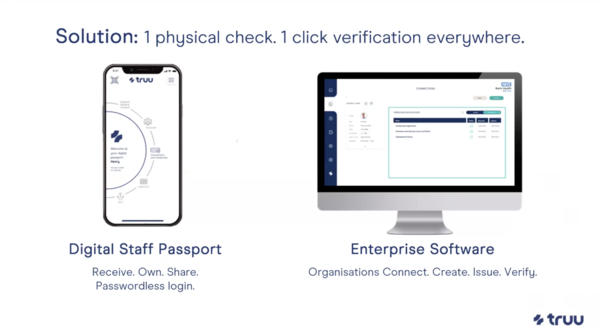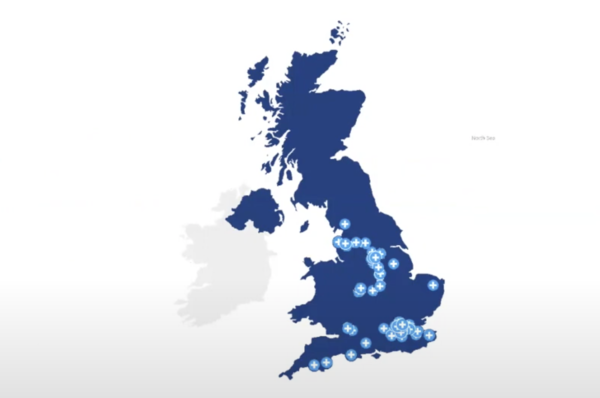Summary
How does a functioning credential ecosystem get started? This post goes deep on Manny Nijjar’s work to create a program for using digital staff passports in the sprawling UK NHS bureaucracy.
Dr Manny Nijjar is an infectious disease doctor with Whipps Cross Hospital in the UK. He’s also an innovator who quickly saw how verifiable credentials could be applied to health care. I first met Manny at the launch of Sovrin Foundation in London in September 2016. He’s been working to bring this vision to life with his company Truu, ever since.
In this video, Manny discusses why he became interested in digital credentials. He also speaks to the influence medical ethics has had on his journey. In 2015, he was training to become an infectious disease specialist. Manny was the most senior clinician on site in the evenings, in charge of about 500 beds.
Manny kept getting called by, and about, a temporary agency doctor every night. Manny and other medical staff had questions about this doctor’s skills, qualifications, and the decisions he was making. But there were shortages and the hospital needed to fill the gap. Manny was so discouraged by seeing an unqualified physician slip through the cracks, that he was about to quit his career, but instead he determined to do something about it.
Serendipitously, Manny came across self-sovereign identity (SSI) at the same time and, as I said, spoke at the launch of Sovrin Foundation. Over the next several years, Manny and his partners worked to create an SSI solution that the National Health Service in the UK could use to instantly verify the identity and skills of temporary and permanent clinical staff. There were three primary problems that this solves:
- Patient Safety - Verifying the identity and skills of temporary and permanent clinical staff.
- Burden on Clinical Staff - Admin time for repeated identity and pre-employment checks.
- Organizational Risk and Operational Inefficiencies - Failure of manual checks. Time and cost to onboard healthcare staff.
Manny’s first thought had been to use a traditional, administrative scheme using usernames and passwords. But he saw the problems with that. He realized a digital credential was a better answer. And his journey into self-sovereign identity commenced.

Over the past five years, Manny and his team at Truu have worked with clinicians, various parts of the NHS, employers, HR departments, and locum agencies to understand their needs and build a solution that fits.
In 2019, Truu conducted a pilot with the NHS where the General Medical Council (GMC) issued “license to practice” credentials to SSI wallets controlled by medical staff. Medical staff could present that credential to Blackpool Teaching Hospitals. The hospital, in turn, issued a “sign in” credential to the staff member who could then use it to log into clinical systems at the hospital.

The Covid-19 pandemic increased the pressure on the NHS, making the need to easily move staff between facilities acute. Truu worked with NHS to use this critical moment to shift to digital credentials and to do it in the right way. Truu’s early work, including the pilot, positioned the idea so that it could be quickly adopted when it was needed most. Digital credentialing in healthcare simplifies onboarding for providers, enables the secure expansion of telehealth services, and enhances information exchange—providing a path to interoperability for healthcare data.
The National Health Service in the UK has a program to issue staff passports to medical personnel, confirming their qualifications and ability to work. NHS staff passports are based on verifiable credentials. Eighty-four NHS organizations are participating to date.

The work that Manny, his team at Truu, and partners like Evernym have done has already had a big impact. The UK Department of Health and Social Care recognized the importance of the program, promising to expand the use of staff passports in their Busting Bureaucracy report. They said:
NHSE/I, NHSX and HEE are working to provide multiple staff groups with access to digital staff passports in line with People Plan commitments to improve workforce agility and to support staff training and development.
- Junior doctors, who frequently rotate to different healthcare providers, are being prioritized and the ambition is that they will have access to staff passports in 2021/22. The passports will hold digital credentials representing their skills, competencies and occupational health checks.
- Other target groups include specialists such as maternity and stroke care staff who often need to be rapidly deployed to a neighboring hospital or care home. The use of digital staff passports will save agency fees and release time for care.
Medical staff passports are catching on in the UK where they are solving real problems that ultimately impact patient care, staff fatigue, and patient access and privacy. The journey hasn’t been short, but the NHS Staff Passport program is illustrative of a successful credential ecosystem.
Related Videos
In this 11 minute video, I explain how trust frameworks function in an ecosystem like the one that the NHS has created.
In this hour-long meetup, Drummond Reed talks with CU Ledger (now Bonifii), about their work to establish a trust framework for credit union credentials. I’ll be writing more about the credit union industry’s MemberPass credential in a future newsletter.
A version of this article was previously published in the Technometria Newsletter, Issue #9, May 4, 2021.
Images are from the SSI For Healthcare: Lessons from the NHS Frontline video referenced above.




